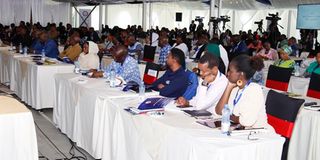Public input key to consensus building in Kenyan politics

Senators follow proceedings during the induction retreat of the 4th Senate in Naivasha on September 20, 2022. While politicians may be the face of political debate, Kenyans themselves have notable power to drive the discourse by denying or acceding to consensus at different stages.
What you need to know:
- While there has been a lot of recalibration of alliances, “across-the-floor” power-sharing seems to have been put aside for now.
- This means that a new consensus is established and the building is pending.
- While politicians may be the face of political debate, Kenyans themselves have notable power to drive the discourse by denying or acceding to consensus at different stages.
With what seems like an end to an extended election period, Kenyans are ready to embark on creating better lives for themselves.
While there has been a lot of recalibration of alliances, “across-the-floor” power-sharing seems to have been put aside for now.
This means that a new consensus is established and the building is pending.
During elections, this is relatively easy, because politicians do little more than mirror party behaviour and tone as a show of loyalty.
After the votes are counted, only one person has won, whether at the Parliament level (Senate or National Assembly), the county level (gubernatorial or county assembly) or the presidential level.
After this, a deeper consensus is needed at several levels. The bicameral Parliament begins to work at the national level, in parallel with the county assemblies and processes in the 47 jurisdictions all over the country.
At this time, members have already been sorted into committees, which focus on different areas of interest to the Kenyan people, such as health, finance, education, information technology and many more.
These dockets also reflect Cabinet portfolio divisions.
Policy needs
These committees, as groups or via their individual members, do direct engagement with the Kenyan public to do research as regards policy needs and changes on the ground.
The 2010 Constitution makes it clear that public participation is core to policy and law changes that reflect the will of the sovereign Kenyan people.
It is thus the duty of these committees to drive authentic public engagement to build consensus as regards the way forward.
This involves listening to individuals, interest groups and more, and acknowledging any areas of conflict and tension, as well as areas of agreement and resonance.
They use this information to update government documentation and research on different areas, then suggest changes through policy documents, amendments to law or creation of new regulations, and other options.
At this point, consensus building becomes more challenging, as officeholders need to amass support from fellow members and ensure that this support stays with them to the end of approval processes for their motions.
This may involve making careful tradeoffs that balance public interest, manifesto promises, national and county priorities and more.
Lobby groups are also introducing discussions on the relevant issues on the ground, making the media a crucial partner in information consolidation, packaging, sharing and analysis.
This is done in a number of ways, such as through surveys, with results being shared for public discussion and media reports featuring a range of voices, and even paid influencer engagement, all geared towards building organic discourse and hastening political decision-making.
As such, while politicians may be the face of political debate, Kenyans themselves have notable power to drive the discourse by denying or acceding to consensus at different stages.
As the new representatives settle down for work, Kenyans will also be gearing up to fill this key role in building a better future for all of us.
Ms Okore is a policy analyst; [email protected]





